137 scholarly books by Autumn House Press and 17
have author last names that start with W
137 scholarly books by Autumn House Press and 17
137 scholarly books by Autumn House Press
17 have author last names that start with W have author last names that start with W
17 have author last names that start with W have author last names that start with W
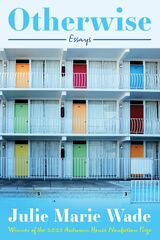
Otherwise
Essays
Julie Marie Wade
Autumn House Press, 2023
A personal lyrical essay collection by a winner of the Lambda Literary Award for Lesbian Memoir.
“I am a butterfly at half-mast. Muscles coiled like springs. I have not unwound yet,” writes Julie Marie Wade in Otherwise. In this series of intimate, braided essays written throughout her 30s, Wade traces her own unwinding and becoming through probing lyricism. As a daughter, lover, lesbian, and writer, she invites readers on a journey of self-discovery framed by memory, literature, and popular culture. Touching and tender, empathic and insightful, Otherwise revels in its author's self-acceptance at the threshold of mid-life.
“I am a butterfly at half-mast. Muscles coiled like springs. I have not unwound yet,” writes Julie Marie Wade in Otherwise. In this series of intimate, braided essays written throughout her 30s, Wade traces her own unwinding and becoming through probing lyricism. As a daughter, lover, lesbian, and writer, she invites readers on a journey of self-discovery framed by memory, literature, and popular culture. Touching and tender, empathic and insightful, Otherwise revels in its author's self-acceptance at the threshold of mid-life.
[more]
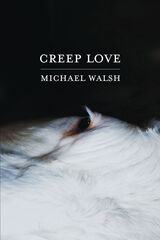
Creep Love
Michael Walsh
Autumn House Press, 2021
Michael Walsh’s poetry collection Creep Love explores a family contending with a complex and ongoing crisis, the aftermath of which creates a shockwave that reverberates through these poems. Stories, half-truths, and lies combine into disturbing fable: A young pregnant woman flees her abusive boyfriend only to discover with terror that he is focused on her younger sister. When her younger sister later gives birth to her abusive ex’s other sons, the unsettling presence of the child’s father becomes unavoidable, and the family soon forces the first son to become a family secret.
We come to find out that the father carries a secret of his own. As tensions rise, attacks within the family escalate and finally culminate in an attempted murder. In Creep Love, Walsh captures the terror of this event, and these poems take us through the surprising outcomes. Near death, rather than floating into light due to hypoxia—a temporary release from the grip of compounding trauma—the speaker sinks into all-encompassing darkness. The anxiety of this moment returns him to his body from the edge of death. These poems give witness to the fallout, demonstrating how love can be charged with something ultimately unknowable.
We come to find out that the father carries a secret of his own. As tensions rise, attacks within the family escalate and finally culminate in an attempted murder. In Creep Love, Walsh captures the terror of this event, and these poems take us through the surprising outcomes. Near death, rather than floating into light due to hypoxia—a temporary release from the grip of compounding trauma—the speaker sinks into all-encompassing darkness. The anxiety of this moment returns him to his body from the edge of death. These poems give witness to the fallout, demonstrating how love can be charged with something ultimately unknowable.
[more]
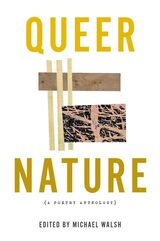
Queer Nature
A Poetry Anthology
Michael Walsh
Autumn House Press, 2022
An anthology of queer nature poetry spanning three centuries.
This anthology amplifies and centers LGBTQIA+ voices and perspectives in a collection of contemporary nature poetry. Showcasing over two hundred queer writers from the nineteenth to the twenty-first century, Queer Nature offers a new context for and expands upon the canon of nature poetry while also offering new lenses through which to view queerness and the natural world.
In the introduction, editor Michael Walsh writes that the anthology is “concerned with poems that speak to and about nature as the term is applied in everyday language to queer and trans bodies and identities . . . Queer Nature remains interested in elements, flora, fauna, habitats, homes, and natural forces—literary aspects of the work that allow queer and trans people to speak within their specific cultural and literary histories of the abnormal, the animal, the elemental, and the unnatural.” The anthology features poets including Elizabeth Bishop, Richard Blanco, Kay Ryan, Jericho Brown, Allen Ginsberg, Natalie Diaz, and June Jordan, as well as emerging voices such as Jari Bradley, Alicia Mountain, Eric Tran, and Jim Whiteside.
This anthology amplifies and centers LGBTQIA+ voices and perspectives in a collection of contemporary nature poetry. Showcasing over two hundred queer writers from the nineteenth to the twenty-first century, Queer Nature offers a new context for and expands upon the canon of nature poetry while also offering new lenses through which to view queerness and the natural world.
In the introduction, editor Michael Walsh writes that the anthology is “concerned with poems that speak to and about nature as the term is applied in everyday language to queer and trans bodies and identities . . . Queer Nature remains interested in elements, flora, fauna, habitats, homes, and natural forces—literary aspects of the work that allow queer and trans people to speak within their specific cultural and literary histories of the abnormal, the animal, the elemental, and the unnatural.” The anthology features poets including Elizabeth Bishop, Richard Blanco, Kay Ryan, Jericho Brown, Allen Ginsberg, Natalie Diaz, and June Jordan, as well as emerging voices such as Jari Bradley, Alicia Mountain, Eric Tran, and Jim Whiteside.
[more]
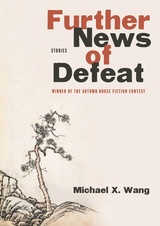
Further News of Defeat
Stories
Michael X. Wang
Autumn House Press, 2020
Steeped in a long history of violence and suffering, Michael X. Wang’s debut collection of short stories interrogates personal and political events set against the backdrop of China that are both real and perceived, imagined and speculative. Wang plunges us into the fictional Chinese village of Xinchun and beyond to explore themes of tradition, family, modernity, and immigration in a country grappling with its modern identity. Violence enters the pastoral when Chinese villagers are flung down a well by Japanese soldiers and forced to abandon their crops and families to work in the coal mines, a tugboat driver dredges up something more than garbage polluting the Suzhou River, and rural and urban landscapes are pitted against each other when young villagers are promised high-paying work in the city but face violent persecution instead. In this world where China has regressed back to its imperial days, we meet an emperor who demands total servitude and swift punishment for attempts at revolution, and we follow a father who immigrates to the United States for a better life and loses everything in a tragic accident—aside from his estranged son—with whom he stubbornly refuses to make amends. Further News of Defeat is rich with characters who have known struggle and defeat and who find themselves locked in pivotal moments of Chinese history—such as World War II and the Tiananmen Square massacre—as they face losses of the highest order and still find cause for revival. Further News of Defeat is the winner of the 2019 Autumn House Press Fiction Prize.
[more]
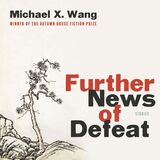
Further News of Defeat
Stories
Michael X. Wang
Autumn House Press, 2020
Steeped in a long history of violence and suffering, Michael X. Wang’s debut collection of short stories interrogates personal and political events set against the backdrop of China that are both real and perceived, imagined and speculative. Wang plunges us into the fictional Chinese village of Xinchun and beyond to explore themes of tradition, family, modernity, and immigration in a country grappling with its modern identity. Violence enters the pastoral when Chinese villagers are flung down a well by Japanese soldiers and forced to abandon their crops and families to work in the coal mines, a tugboat driver dredges up something more than garbage polluting the Suzhou River, and rural and urban landscapes are pitted against each other when young villagers are promised high-paying work in the city but face violent persecution instead. In this world where China has regressed back to its imperial days, we meet an emperor who demands total servitude and swift punishment for attempts at revolution, and we follow a father who immigrates to the United States for a better life and loses everything in a tragic accident—aside from his estranged son—with whom he stubbornly refuses to make amends. Further News of Defeat is rich with characters who have known struggle and defeat and who find themselves locked in pivotal moments of Chinese history—such as World War II and the Tiananmen Square massacre—as they face losses of the highest order and still find cause for revival. Further News of Defeat is the winner of the 2019 Autumn House Press Fiction Prize.
[more]
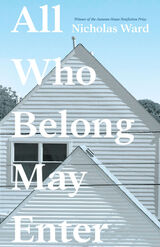
All Who Belong May Enter
Nicholas Ward
Autumn House Press, 2021
A collection of personal essays examining relationships, whiteness, and masculinity.
Nicholas Ward’s debut essay collection, All Who Belong May Enter, centers on self-exploration and cultural critique. These deeply personal essays examine whiteness, masculinity, and a Midwest upbringing through tales of sporting events, parties, posh (and not-so-posh) restaurant jobs, and the many relationships built and lost along the way. With a storyteller’s spirit, Ward recounts and evaluates the privilege of his upbringing with acumen and vulnerability. Ward’s profound affection for his friends, family, lovers, pets, and particularly for his chosen home, Chicago, shines through. This collection offers readers hope for healing that comes through greater understanding and inquiry into one’s self, relationships, and culture. Through these essays, Ward acknowledges his position within whiteness and masculinity, and he continuously holds himself and the society around him accountable.
All Who Belong May Enter was selected by Jaquira Díaz as the winner of the 2020 Autumn House Nonfiction Prize.
Nicholas Ward’s debut essay collection, All Who Belong May Enter, centers on self-exploration and cultural critique. These deeply personal essays examine whiteness, masculinity, and a Midwest upbringing through tales of sporting events, parties, posh (and not-so-posh) restaurant jobs, and the many relationships built and lost along the way. With a storyteller’s spirit, Ward recounts and evaluates the privilege of his upbringing with acumen and vulnerability. Ward’s profound affection for his friends, family, lovers, pets, and particularly for his chosen home, Chicago, shines through. This collection offers readers hope for healing that comes through greater understanding and inquiry into one’s self, relationships, and culture. Through these essays, Ward acknowledges his position within whiteness and masculinity, and he continuously holds himself and the society around him accountable.
All Who Belong May Enter was selected by Jaquira Díaz as the winner of the 2020 Autumn House Nonfiction Prize.
[more]
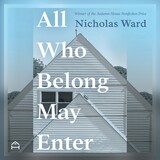
All Who Belong May Enter
Nicholas Ward
Autumn House Press, 2021
A collection of personal essays examining relationships, whiteness, and masculinity.
Nicholas Ward’s debut essay collection, All Who Belong May Enter, centers on self-exploration and cultural critique. These deeply personal essays examine whiteness, masculinity, and a Midwest upbringing through tales of sporting events, parties, posh (and not-so-posh) restaurant jobs, and the many relationships built and lost along the way. With a storyteller’s spirit, Ward recounts and evaluates the privilege of his upbringing with acumen and vulnerability. Ward’s profound affection for his friends, family, lovers, pets, and particularly for his chosen home, Chicago, shines through. This collection offers readers hope for healing that comes through greater understanding and inquiry into one’s self, relationships, and culture. Through these essays, Ward acknowledges his position within whiteness and masculinity, and he continuously holds himself and the society around him accountable.
All Who Belong May Enter was selected by Jaquira Díaz as the winner of the 2020 Autumn House Nonfiction Prize.
Nicholas Ward’s debut essay collection, All Who Belong May Enter, centers on self-exploration and cultural critique. These deeply personal essays examine whiteness, masculinity, and a Midwest upbringing through tales of sporting events, parties, posh (and not-so-posh) restaurant jobs, and the many relationships built and lost along the way. With a storyteller’s spirit, Ward recounts and evaluates the privilege of his upbringing with acumen and vulnerability. Ward’s profound affection for his friends, family, lovers, pets, and particularly for his chosen home, Chicago, shines through. This collection offers readers hope for healing that comes through greater understanding and inquiry into one’s self, relationships, and culture. Through these essays, Ward acknowledges his position within whiteness and masculinity, and he continuously holds himself and the society around him accountable.
All Who Belong May Enter was selected by Jaquira Díaz as the winner of the 2020 Autumn House Nonfiction Prize.
[more]
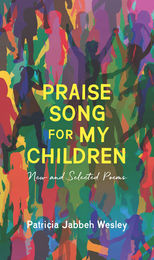
Praise Song for My Children
New and Selected Poems
Patricia Jabbeh Wesley
Autumn House Press, 2020
Praise Song for My Children celebrates twenty-one years of poetry by one of the most significant African poets of this century. Patricia Jabbeh Wesley guides us through the complex and intertwined highs and lows of motherhood and all the roles that it encompasses: parent, woman, wife, sister, friend. Her work is deeply personal, drawing from her own life and surroundings to convey grief, the bleakness of war, humor, deep devotion, and the hope of possibility. These poems lend an international voice to the tales of motherhood, as Wesley speaks both to the African and to the Western experience of motherhood, particularly black motherhood. She pulls from African motifs and proverbs, utilizing the poetics of both the West and Africa to enrich her striking emotional range. Leading us to the depths of mourning and the heights of tender love, she responds to American police brutality, writing “To be a black woman is to be a woman, / ready to mourn,” and remembers a dear friend who is at once “mother and wife and friend and pillar / and warrior woman all in one.”
Wesley writes poetry that moves with her through life, land, and love, seeing with eyes that have witnessed both national and personal tragedy and redemption. Born in Tugbakeh, Liberia and raised in Monrovia, Wesley immigrated to the United States in 1991 to escape the Liberian civil war. In this moving collection, she invites us to join her as she buries loved ones, explores long-distance connections through social media, and sings bittersweet praises of the women around her, of mothers, and of Africa.
Wesley writes poetry that moves with her through life, land, and love, seeing with eyes that have witnessed both national and personal tragedy and redemption. Born in Tugbakeh, Liberia and raised in Monrovia, Wesley immigrated to the United States in 1991 to escape the Liberian civil war. In this moving collection, she invites us to join her as she buries loved ones, explores long-distance connections through social media, and sings bittersweet praises of the women around her, of mothers, and of Africa.
[more]
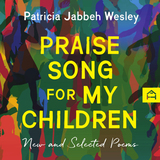
Praise Song for My Children
New and Selected Poems
Patricia Jabbeh Wesley
Autumn House Press, 2022
Praise Song for My Children celebrates twenty-one years of poetry by one of the most significant African poets of this century. Patricia Jabbeh Wesley guides us through the complex and intertwined highs and lows of motherhood and all the roles that it encompasses: parent, woman, wife, sister, friend. Her work is deeply personal, drawing from her own life and surroundings to convey grief, the bleakness of war, humor, deep devotion, and the hope of possibility. These poems lend an international voice to the tales of motherhood, as Wesley speaks both to the African and to the Western experience of motherhood, particularly black motherhood. She pulls from African motifs and proverbs, utilizing the poetics of both the West and Africa to enrich her striking emotional range. Leading us to the depths of mourning and the heights of tender love, she responds to American police brutality, writing “To be a black woman is to be a woman, / ready to mourn,” and remembers a dear friend who is at once “mother and wife and friend and pillar / and warrior woman all in one.”
Wesley writes poetry that moves with her through life, land, and love, seeing with eyes that have witnessed both national and personal tragedy and redemption. Born in Tugbakeh, Liberia and raised in Monrovia, Wesley immigrated to the United States in 1991 to escape the Liberian civil war. In this moving collection, she invites us to join her as she buries loved ones, explores long-distance connections through social media, and sings bittersweet praises of the women around her, of mothers, and of Africa.
Wesley writes poetry that moves with her through life, land, and love, seeing with eyes that have witnessed both national and personal tragedy and redemption. Born in Tugbakeh, Liberia and raised in Monrovia, Wesley immigrated to the United States in 1991 to escape the Liberian civil war. In this moving collection, she invites us to join her as she buries loved ones, explores long-distance connections through social media, and sings bittersweet praises of the women around her, of mothers, and of Africa.
[more]
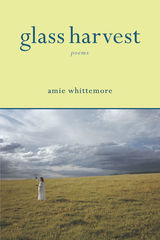
Glass Harvest
Amie Whittemore
Autumn House Press, 2016
Amie Whittemore's debut poetry collection, Glass Harvest, focuses on our intimate connection to the natural world and how it shapes us. The book explores the struggle of relationships changing (or ending) and how we come to understand and accept our past. Anyone prone to nostalgia and anyone who celebrates the smallest aspects of our everyday world will love Whittemore's work.
[more]

Nest of Matches
Amie Whittemore
Autumn House Press, 2024
Poems that bask in the beauty of nature, queerness, and love while exploring how dichotomies form identity.
Amie Whittemore’s Nest of Matches is a lavish declaration of the beauty of the natural world, queer identity, and of the imagination set free. Whittemore’s third collection explores the complexities of love—romantic, familial, and love for place—and wonders at cycles of life, finding that: “Every habit / even love—strangest / of them all—offers exhaustion / and renewal.” Moving seamlessly from meditations on the moon’s phases to explorations of dream spaces to searches for meaning through patterns of love and loss, Whittemore’s work embodies the mysteries of dichotomies—grief and joy, consciousness and unconsciousness, habit and spontaneity—and how they coexist to create our identities. Throughout the collection, Whittemore reveals how interior nature manifests into exterior habits and how physical landscapes shape the psyche.
Amie Whittemore’s Nest of Matches is a lavish declaration of the beauty of the natural world, queer identity, and of the imagination set free. Whittemore’s third collection explores the complexities of love—romantic, familial, and love for place—and wonders at cycles of life, finding that: “Every habit / even love—strangest / of them all—offers exhaustion / and renewal.” Moving seamlessly from meditations on the moon’s phases to explorations of dream spaces to searches for meaning through patterns of love and loss, Whittemore’s work embodies the mysteries of dichotomies—grief and joy, consciousness and unconsciousness, habit and spontaneity—and how they coexist to create our identities. Throughout the collection, Whittemore reveals how interior nature manifests into exterior habits and how physical landscapes shape the psyche.
[more]
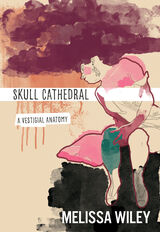
Skull Cathedral
A Vestigial Anatomy
Melissa Wiley
Autumn House Press, 2020
In Skull Cathedral, Melissa Wiley pulls stories from the vestigial remnants of the creatures we were or could have become. The appendix, pinky toes, tonsils, male nipples, wisdom teeth, and coccyx are starting points through which Wiley explores exaltation, eroticism, grief, and desire. Using the slow evolution and odd disintegration of vestigial organs to enter the braided stories of the lives we establish for ourselves, the people we grieve, and the mysteries of youth, memory, and longing, Wiley’s lens is deeply feminist and compassionate.
Turning to these mysterious anatomical remnants, she finds insight into the lingering questions of loss and the nagging sensations of being incomplete. For instance, in considering the appendix, Wiley finds herself working through her grief after the loss of her father, a sensation that again resurfaces in the face of the moon as she looks to the sky. Testing the boundaries of genre and fighting to expand the limits of perception, the stylized essays of Skull Cathedral embrace the strangeness of life through the lingering peculiarities of the human body. Skull Cathedral, Wiley’s second book of nonfiction, won the 2019 Autumn House Nonfiction Prize.
Turning to these mysterious anatomical remnants, she finds insight into the lingering questions of loss and the nagging sensations of being incomplete. For instance, in considering the appendix, Wiley finds herself working through her grief after the loss of her father, a sensation that again resurfaces in the face of the moon as she looks to the sky. Testing the boundaries of genre and fighting to expand the limits of perception, the stylized essays of Skull Cathedral embrace the strangeness of life through the lingering peculiarities of the human body. Skull Cathedral, Wiley’s second book of nonfiction, won the 2019 Autumn House Nonfiction Prize.
[more]
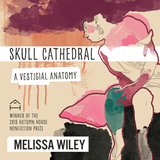
Skull Cathedral
A Vestigial Anatomy
Melissa Wiley
Autumn House Press, 2021
In Skull Cathedral, Melissa Wiley pulls stories from the vestigial remnants of the creatures we were or could have become. The appendix, pinky toes, tonsils, male nipples, wisdom teeth, and coccyx are starting points through which Wiley explores exaltation, eroticism, grief, and desire. Using the slow evolution and odd disintegration of vestigial organs to enter the braided stories of the lives we establish for ourselves, the people we grieve, and the mysteries of youth, memory, and longing, Wiley’s lens is deeply feminist and compassionate.
Turning to these mysterious anatomical remnants, she finds insight into the lingering questions of loss and the nagging sensations of being incomplete. For instance, in considering the appendix, Wiley finds herself working through her grief after the loss of her father, a sensation that again resurfaces in the face of the moon as she looks to the sky. Testing the boundaries of genre and fighting to expand the limits of perception, the stylized essays of Skull Cathedral embrace the strangeness of life through the lingering peculiarities of the human body. Skull Cathedral, Wiley’s second book of nonfiction, won the 2019 Autumn House Nonfiction Prize.
Turning to these mysterious anatomical remnants, she finds insight into the lingering questions of loss and the nagging sensations of being incomplete. For instance, in considering the appendix, Wiley finds herself working through her grief after the loss of her father, a sensation that again resurfaces in the face of the moon as she looks to the sky. Testing the boundaries of genre and fighting to expand the limits of perception, the stylized essays of Skull Cathedral embrace the strangeness of life through the lingering peculiarities of the human body. Skull Cathedral, Wiley’s second book of nonfiction, won the 2019 Autumn House Nonfiction Prize.
[more]
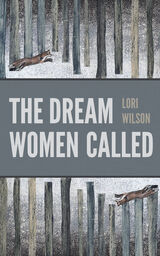
The Dream Women Called
Lori Wilson
Autumn House Press, 2021
Through the poems in The Dream Women Called, Lori Wilson attends to the spirits of depression, uncertainty, and fear while wondering at the beauty in what’s broken, the remarkable in the ordinary, and the balm that the natural world can offer. Following a single speaker, we’re reminded how many lives one woman can live.
This book is about crossing into a new version of your own story—after a marriage ends, the parents die, the children are grown, or the faith is discarded—and finding a place to stand, a new way to take up space in the world. Uniting past and present, these poems create multifaceted portraits, particularly of relationships between mothers and daughters. Wilson’s poems sift through memory, dreams, art, imagination, nature, and close observation, turning each discovery over in order to see it fully. Beneath the fine-grained imagery of these lyric excavations are the sometimes opposing but fundamental desires to be whole and to be seen, which often means looking within as well as turning toward the world outside. The speaker is listening always for the dream women who call, for whatever may beckon from the present and future, preparing her in some way for a life that’s truly hers.
This book is about crossing into a new version of your own story—after a marriage ends, the parents die, the children are grown, or the faith is discarded—and finding a place to stand, a new way to take up space in the world. Uniting past and present, these poems create multifaceted portraits, particularly of relationships between mothers and daughters. Wilson’s poems sift through memory, dreams, art, imagination, nature, and close observation, turning each discovery over in order to see it fully. Beneath the fine-grained imagery of these lyric excavations are the sometimes opposing but fundamental desires to be whole and to be seen, which often means looking within as well as turning toward the world outside. The speaker is listening always for the dream women who call, for whatever may beckon from the present and future, preparing her in some way for a life that’s truly hers.
[more]
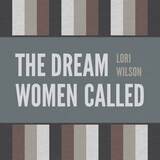
The Dream Women Called
Lori Wilson
Autumn House Press, 2021
Through the poems in The Dream Women Called, Lori Wilson attends to the spirits of depression, uncertainty, and fear while wondering at the beauty in what’s broken, the remarkable in the ordinary, and the balm that the natural world can offer. Following a single speaker, we’re reminded how many lives one woman can live.
This book is about crossing into a new version of your own story—after a marriage ends, the parents die, the children are grown, or the faith is discarded—and finding a place to stand, a new way to take up space in the world. Uniting past and present, these poems create multifaceted portraits, particularly of relationships between mothers and daughters. Wilson’s poems sift through memory, dreams, art, imagination, nature, and close observation, turning each discovery over in order to see it fully. Beneath the fine-grained imagery of these lyric excavations are the sometimes opposing but fundamental desires to be whole and to be seen, which often means looking within as well as turning toward the world outside. The speaker is listening always for the dream women who call, for whatever may beckon from the present and future, preparing her in some way for a life that’s truly hers.
This book is about crossing into a new version of your own story—after a marriage ends, the parents die, the children are grown, or the faith is discarded—and finding a place to stand, a new way to take up space in the world. Uniting past and present, these poems create multifaceted portraits, particularly of relationships between mothers and daughters. Wilson’s poems sift through memory, dreams, art, imagination, nature, and close observation, turning each discovery over in order to see it fully. Beneath the fine-grained imagery of these lyric excavations are the sometimes opposing but fundamental desires to be whole and to be seen, which often means looking within as well as turning toward the world outside. The speaker is listening always for the dream women who call, for whatever may beckon from the present and future, preparing her in some way for a life that’s truly hers.
[more]
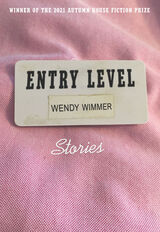
Entry Level
Wendy Wimmer
Autumn House Press, 2022
Tales of characters trying to find their way through the struggles of underemployment.
Wendy Wimmer’s debut short story collection, Entry Level, contains a range of characters who are trying to find, assert, or salvage their identities. These fifteen stories center around the experience of being underemployed—whether by circumstance, class, gender, race, or other prevailing factors—and the toll this takes on an individual. Wimmer pushes the boundaries of reality, creating stories that are funny, fantastic, and at times terrifying. Her characters undergo feats of endurance, heartbreak, and loneliness, all while trying to succeed in a world that so often undervalues them. From a young marine biologist suffering from imposter syndrome and a haunting to a bingo caller facing another brutal snowstorm and a creature that may or not be an angel, Wimmer’s characters are all confronting an oppressive universe that seemingly operates against them or is, at best, indifferent to them. These stories reflect on the difficulties of modern-day survival and remind us that piecing together a life demands both hope and resilience.
Entry Level was selected by Deesha Philyaw as the winner of the 2021 Autumn House Fiction Prize.
Wendy Wimmer’s debut short story collection, Entry Level, contains a range of characters who are trying to find, assert, or salvage their identities. These fifteen stories center around the experience of being underemployed—whether by circumstance, class, gender, race, or other prevailing factors—and the toll this takes on an individual. Wimmer pushes the boundaries of reality, creating stories that are funny, fantastic, and at times terrifying. Her characters undergo feats of endurance, heartbreak, and loneliness, all while trying to succeed in a world that so often undervalues them. From a young marine biologist suffering from imposter syndrome and a haunting to a bingo caller facing another brutal snowstorm and a creature that may or not be an angel, Wimmer’s characters are all confronting an oppressive universe that seemingly operates against them or is, at best, indifferent to them. These stories reflect on the difficulties of modern-day survival and remind us that piecing together a life demands both hope and resilience.
Entry Level was selected by Deesha Philyaw as the winner of the 2021 Autumn House Fiction Prize.
[more]
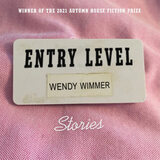
Entry Level
Wendy Wimmer
Autumn House Press, 2023
Tales of characters trying to find their way through the struggles of underemployment.
Wendy Wimmer’s debut short story collection, Entry Level, contains a range of characters who are trying to find, assert, or salvage their identities. These fifteen stories center around the experience of being underemployed—whether by circumstance, class, gender, race, or other prevailing factors—and the toll this takes on an individual. Wimmer pushes the boundaries of reality, creating stories that are funny, fantastic, and at times terrifying. Her characters undergo feats of endurance, heartbreak, and loneliness, all while trying to succeed in a world that so often undervalues them. From a young marine biologist suffering from imposter syndrome and a haunting to a bingo caller facing another brutal snowstorm and a creature that may or not be an angel, Wimmer’s characters are all confronting an oppressive universe that seemingly operates against them or is, at best, indifferent to them. These stories reflect on the difficulties of modern-day survival and remind us that piecing together a life demands both hope and resilience.
Entry Level was selected by Deesha Philyaw as the winner of the 2021 Autumn House Fiction Prize.
Wendy Wimmer’s debut short story collection, Entry Level, contains a range of characters who are trying to find, assert, or salvage their identities. These fifteen stories center around the experience of being underemployed—whether by circumstance, class, gender, race, or other prevailing factors—and the toll this takes on an individual. Wimmer pushes the boundaries of reality, creating stories that are funny, fantastic, and at times terrifying. Her characters undergo feats of endurance, heartbreak, and loneliness, all while trying to succeed in a world that so often undervalues them. From a young marine biologist suffering from imposter syndrome and a haunting to a bingo caller facing another brutal snowstorm and a creature that may or not be an angel, Wimmer’s characters are all confronting an oppressive universe that seemingly operates against them or is, at best, indifferent to them. These stories reflect on the difficulties of modern-day survival and remind us that piecing together a life demands both hope and resilience.
Entry Level was selected by Deesha Philyaw as the winner of the 2021 Autumn House Fiction Prize.
[more]
READERS
Browse our collection.
PUBLISHERS
See BiblioVault's publisher services.
STUDENT SERVICES
Files for college accessibility offices.
UChicago Accessibility Resources
home | accessibility | search | about | contact us
BiblioVault ® 2001 - 2024
The University of Chicago Press









